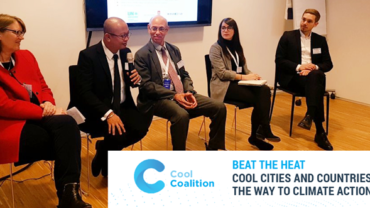For the past three years, UNEP DTU Partnership has worked to develop, promote and implement green and efficient district energy solutions around the world, with the support of the Bitten & Mads Clausen Foundation.
Now the foundation has renewed its support to UNEP DTU Partnership’s work to accelerate the deployment and investments in district energy systems.
The support will help increase and develop the partnership’s work on the mounting challenge of cities’ growing need for energy and environmentally sustainable solutions.
In the new agreement, the foundation has granted DKK 9 mio. or approximately USD 1.3 mio. for UNEP DTU Partnership’s Copenhagen Centre on Energy Efficiency, with focus on the centre’s work on the District Energy in Cities Initiative.
The District Energy in Cities Initiative is one of six accelerators of the Sustainable Energy for All (SEforALL) Energy Efficiency Hub, hosted by the UNEP DTU Partnership’s Copenhagen Centre on Energy Efficiency.
Advancing new projects towards realization
For three years the foundation has supported UNEP DTU Partnership’s work on district energy, directly helping the partnership’s Copenhagen Centre on Energy Efficiency expand its expertise and work with cities around the world.
“The foundation supports projects within renewable energy and energy efficiency that advance Danfoss’ vision of sustainable behaviour and solutions and has in that context been supporting UNEP DTU Partnership’s work. The Partnership has since 2016 proved very successful in placing district energy on the agenda in a global context, with an approach where technical experts engaged by UNEP DTU Partnership are supporting directly with information, analysis and consulting ‘on the ground’. The initiative has a strong action- and result orientation, effectively advancing new projects towards realization,” says Per Have, CEO of the Bitten & Mads Clausen Foundation.
Founded by Mads Clausen in 1933, Danfoss is now a leading company in cooling, air conditioning, heating, district energy and other areas. Bitten & Mads Clausen Foundation is the majority owner of Danfoss A/S.
Building momentum
In 2016, the Bitten & Mads Clausen Foundation awarded funding to a ‘City Office’ of the District Energy in Cities Initiative based at the Copenhagen Centre on Energy Efficiency, in recognition of its role in providing knowledge sharing, technical backstopping, and promotional activities for energy efficiency. The funding was provided with a focus on support to the initiative, where Danfoss A/S is a co-lead.
“Over the past three years, with the support of the Bitten & Mads Clausen Foundation and Danfoss, we have successfully supported the kick start of new concrete projects on all continents, both in district heating and district cooling, as a way of solving challenges local communities were facing.” Says UNEP DTU Partnership Head of Strategy for Business Models and Markets, Gabriela Dias of the importance of the support.
Since 2016, the District Energy in Cities Initiative has grown and reached out to more than 40 cities in Eastern Europe, Asia, Africa and Latin America, with significant momentum towards new projects soon reaching procurement phase in Chile, India, Serbia and Morocco. The funding from the Bitten & Mads Clausen Foundation has been instrumental in achieving these.
In Chile this work has led to 14 cities, including the capital Santiago, exploring district heating options for heating, based on a pilot project in the city of Temuco, assisted by the Copenhagen Centre on Energy Efficiency.
A strong momentum has been created around district energy, both for heating and for cooling. This momentum is not only driven by energy efficiency as tool for climate mitigation, but also seen as an air-pollution mitigation opportunity, highly noteworthy in many developing countries and cities.
Expanding and scaling projects
The continued partnership with the Bitten and Mads Clausen Foundation allows for wider and more productive collaborations, both in already engaged countries and new ones.
It also opens the possibility of strong integration of industry involvement with the District Energy in Cities Initiative.
The funding will furthermore allow for additional work on the potential of centralised heating and cooling systems in industrial-type of facilities, building on projects that are underway for cooling in the data centre sector and at energy intensive industrial sites.
“There is a lot happening within the district energy agenda, both at the higher political level, but also in terms of developing tools for doing assessments of the potential for this technology and capacity exchange. This support will help make sure that these projects come to life and that we are able to expand projects and gain scale”, Gabriela Dias says.
UNEP DTU Partnership and the Copenhagen Centre on Energy Efficiency will build on the existing operations, and extend the work on district energy both in its current scope and potentially to other key action areas, such as enhanced use of both renewable heat sources and excess heat from industry and datacentres.
The new funding will also allow expansion of the engagement to new cities and countries.
A practical solution
As cities are becoming more and more important as engines for global economic growth and socio-economic development, they are at the same time recognised as increasingly important and influential actors and decision makers in the global transition towards green energy.
By 2030, almost 5 billion people (about 60 percent of the global population) will live in cities, leading to massive requirements for energy to power growth and expand basic infrastructure. Energy efficiency can offer practical solutions to meet energy needs without sacrificing development or environmental priorities.
District energy is recognised as one of the main city-level options that could play an important role, enhancing the overall energy efficiency movement and contributing to the achievement of the targets in the Paris Climate Agreement, as well as the UN Sustainable Development Goals.
However, despite the availability of energy efficiency technology and well-proven approaches to investments, non-market barriers still impede the full potential of deployment.



